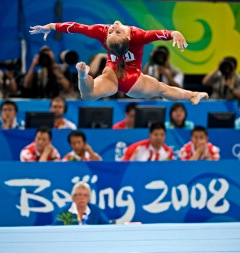 Ron Wyatt’s best tip for getting to know your camera is to leave your manual in the bathroom.
Ron Wyatt’s best tip for getting to know your camera is to leave your manual in the bathroom.
“Every time you spend quality time in the bathroom you’ll learn something new,” he said on Thursday, April 11 in the Dodge Room of the Williston Northampton School. “Great photo opportunities come up, you don’t want to be playing around trying to figure out how to work your camera.”
An Explosive Entrance to Freelancing
On December 5, 1970 the Linden, NJ Exxon refinery exploded. Working nearby on the General Motors assembly line, Mr. Wyatt ran to the scene and photographed the aftermath. Later that day he called an area newspaper to see if they were interested. Although they didn’t want photographs of the explosion, they reviewed his work and offered him a position as a freelance photographer.
Mr. Wyatt continued to work at the GM plant from 6:30 a.m. to 3:00 p.m. shooting freelance assignments on nights and weekends. His next big break as a photographer came when he volunteered to cover a New York Giants football game; he had never covered sports before.
“Now that I think of it,” said Mr. Wyatt, “that was dumb to volunteer, having never shot sports in my life.”
But Mr. Wyatt returned to the photo desk with shots of pass receptions, fumbles – every major play of the game. “I was all over it, I had great stuff,” he said.
Mr. Wyatt eventually earned credentials to shoot the Giants on a regular basis, and his opportunities grew from there.
“My whole career has been talking to people and opportunities come up,” Mr. Wyatt said.
Once, when Mr. Wyatt was on assignment at a basketball game, another photographer showed up late. There was no room left on the sidelines where photographers are allowed to sit and no one wanted to make room. Mr. Wyatt scooted over and gestured for the man to sit down next to him. The photographer then proceeded to take out of his bag, what was at that time, top-of-the-line camera equipment.
Mr. Wyatt remembers saying, “Wow, I can’t wait until I can afford to buy that kind of equipment.” The man handed Mr. Wyatt his card and told him to call his office on Monday morning.
It turned out the photographer was the vice president of Canon Professional Services. He set Mr. Wyatt up with all the equipment he would need to get his freelance career up and running.
One Roll Black and White, One Roll Color
From then on Mr. Wyatt would shoot one roll of black and white film for the newspaper and one roll of color film for himself. He submitted the color shots to different sports magazines and stock agencies, and through those connections, had the opportunity to shoot the 2004 Athens Olympics.
“I think [the Olympics] are the ultimate assignment,” he said. “The only assignment that would top the Olympics is a day in the life of Jesus Christ.”
Kodak hired Mr. Wyatt to shoot the Olympics for them as well as to photograph some of the company’s VIPs, who were also attending the games. He impressed Kodak so much with his work that four years later the company again hired him to shoot the Olympics, this time for the 2008 summer games in Beijing.
Between shooting VIPs against the Great Wall of China and events such as a boxing match from above the ring, Mr. Wyatt was constantly looking for new angles.
While other photographers took two or three frames and then looked down to review their shots, Mr. Wyatt was snapping away.
“I don’t go click…click…click. I go cliiiiiiiick, like a machine gun,” he motioned with an imaginary camera held up to his eye. “Whatever it takes to make the shot you want,” he said.
By the time the closing ceremony in Beijing rolled around and he flew back to the United States, Mr. Wyatt had shot more than 50,000 frames.
Mr. Wyatt stressed that constant practice makes a career. He never misses an opportunity to take a walk with his camera, he said, “even if it’s raining, we’re shooting.”
Editor’s note: The final installment in the 2012-13 Photographers’ Lecture Series is Tuesday, April 23, at 6:30 p.m. with Michael Zide and Braden Chattman from the Hallmark Institute of Photography.

